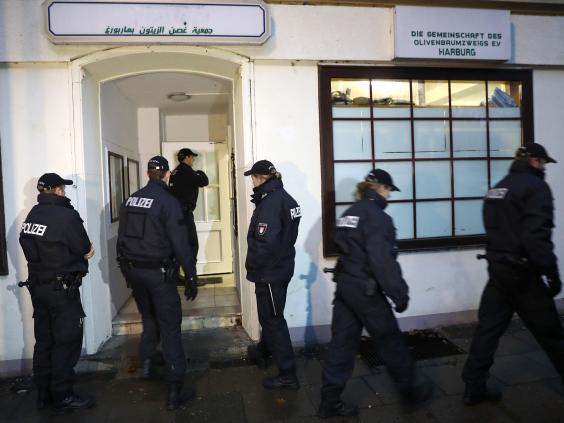Saudi Arabia and Gulf states 'support Islamic extremism in Germany,' intelligence report finds
Saudi
Arabia's ambassador to Germany denies his government funds extremist
groups
18
December, 2016
Saudi Arabia, Kuwait and Qatar are supporting extremist Islamic groups in Germany, according to a leaked intelligence report.
A
brief seen by the Süddeutsche
Zeitung and
broadcasters NDR and WDR raised concern over a reported increase in
support for fundamentalist Salafism in Germany, warning that the
ideology already has 10,000 followers and is growing.
The
report, by Germany’s BfV domestic intelligence agency and Federal
Intelligence Service (BND) reportedly accused Gulf groups of funding
mosques, religious schools, hardline preachers and conversion or
“dawah” groups to spread the ideology
Missionary
movements were part of a “long-running strategy to exert influence”
by the three states, it found, naming the Saudi Muslim World League,
Sheikh Eid Bin Mohammad al-Thani Charitable Association and Kuwaiti
Revival of Islamic Heritage Society (RIHS), which has been banned by
the US and Russia for allegedly supporting al-Qaeda.
The
report said all three organisations were “closely connected with
government offices in their home countries”.
The
BND and BfV have not confirmed the accuracy of leaked excerpts but
sources toldDeutsche
Welle that
some members of the security community believe it was internally
leaked to pressure the German government into stopping controversial
arms sales to Saudi Arabia.
He
added that the Muslim World League was not a Saudi government
organisation and discontinued activities in Germany in 2013.
The
Sheikh Eid association and RIHS have also denied connections to
jihadi terrorism in the past.
The
report comes weeks after the German government banned
an Islamist missionary group linked
to more than 140 Isis fighters following raids on mosques, offices
and homes across the country.
Die
Wahre Religion (DWR), meaning “The True Religion”, started in
2005 and claimed to spread Islam in Germany “in a modern form and
with the help of new media”.
The
Salafist group gained prominence with a Quran distribution campaign
called Lies!, meaning “Read!”, which has since spread to
countries including the UK, France, Bahrain and Brazil.
But
officials said the initiative was “bringing jihadi Islamists
together across the nation under the pretext of preaching Islam”
while spreading hate and conspiracy theories.
Thomas
de Maiziere, the German interior minister, said that the prohibition
of DWR aimed to stop the “abuse of a religion by people, who under
the pretext of spreading Islam are propagating extremist ideologies
and supporting terrorist organisations”.

Police
officers stand in front of the Al-Taqwa Mosque during a search in
Hamburg, Germany, 15 November 2016. (EPA)
“By
banning this organisation, a major source of radicalisation has been
eradicated nationwide,” he added.
A terror
network radicalising young Muslims and
sending them to fight for Isis in Syria was also dismantled by
authorities last month.
Germany
has been on high alert since it was hit by two terror attacks carried
out by Isis supporters
in July, with other plots subsequently uncovered amid warnings that
attempts to attack Europe will continue.
Jaber
al-Bakr, a suspected Isis supporter detained on suspicion of planning
to attack a Berlin airport with homemade explosives,killed
himself in prison days
after being arrested in October.
According
to figures released in May by intelligence services, 820 jihadis have
left Germany for Syria and Iraq, with a third known to have returned,
140 killed and 420 remaining abroad.
Tensions
have risen following the arrival of almost 900,000 refugees in the
country last year, driving support for right-wing groups and a
national debate on Islam and integration.
The
issue sparked Angela
Merkel's call for a burqa ban earlier
this month, as she seeks a fourth term in office.




No comments:
Post a Comment
Note: only a member of this blog may post a comment.